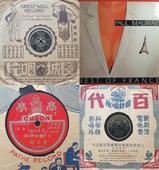 Chen Mo, who runs an audiovisual-product company in Shanghai, boasts a collection of some 10,000 vinyl records spanning various genres. (PHOTO PROVIDED TO CHINA DAILY)
Chen Mo, who runs an audiovisual-product company in Shanghai, boasts a collection of some 10,000 vinyl records spanning various genres. (PHOTO PROVIDED TO CHINA DAILY)
Listening to music has never been more effortless than in today's digital era. Instead of having to insert cassette tapes or CDs into audio systems, one needs just a few clicks of the mouse or swipes on a smartphone to gain access to a vast database of songs stored online.
But for Chen Mo, the act of listening to music is markedly a more deliberate affair that requires unsheathing a vinyl from its cover, laying the record on the turntable and gently placing the gramophone needle onto the groove.
"Records have a warmer sound than digital music. It feels almost as if the music is being performed right in front of you. It feels like I'm chatting face-to-face with an old friend," says Chen, who has been collecting vinyl records since the 1980s.
Today, the 50-year-old boasts a collection of some 10,000 vinyl records spanning various genres, including Chinese opera, pop music and classical music. Some of his rare records cost him as much as 10,000 yuan (US$1,440).
"My collections are stored in three places-a study room at home, a warehouse and a studio in the workplace. This prevents the records from warping and cracking, as they can't bear too much weight when stacked on top of one another," he says.
Chen, who runs an audiovisual-product company in Shanghai, says his love for music was inherited from his parents-his mother was a fan of Chinese operas and the father loved Suzhou Pingtan.
As his parents could not afford a radio, Chen used to sit at the doorsteps of his neighbor's home just so he could listen to music. The situation changed when Chen started working as a salesman at a department store in the 1980s.
"The average monthly salary in the city then was around 400 yuan, but I managed to earn about 1,000 yuan. This allowed me to buy a phonograph for 85 yuan as well as some records," he says.
 Chen Mo's vinyl-record collection includes one (top left) by the Great Wall Record Company that features four famous artists performing the Peking Opera, Si Wu Hua Dong. (PHOTO PROVIDED TO CHINA DAILY)
Chen Mo's vinyl-record collection includes one (top left) by the Great Wall Record Company that features four famous artists performing the Peking Opera, Si Wu Hua Dong. (PHOTO PROVIDED TO CHINA DAILY)
The first records he purchased were Amour by Hong Kong pop singer Jacky Cheung, which cost 10 yuan, and a 3-yuan record by Huju Opera artist Yang Feifei. Records by famous Chinese singers of the past such as Nightlife in Shanghai by Zhou Xuan and Rose, Rose, I Love You by Yao Li can also be found in his collection.
One of his more extravagant purchases that cost 2,000 yuan was the record by the Great Wall Record Company which features four famous artists, Cheng Yanqiu, Shang Xiaoyun, Mei Lanfang and Xun Huisheng, performing the Peking Opera, Si Wu Hua Dong.
Half of his records are those produced after the 1930s, a period that marked the boom in international trade and a rapid growth of the middle class in Shanghai.
According to Chen, records were popular until just before the turn of the millennium when portable music devices like CD players and digital music started to grow in popularity.
Records, however, have started to make a comeback in recent years, though only a few companies in the suburbs of Guangzhou and the Caohejing development zone in Shanghai still manufacture these sound-storage mediums.
As such, collectors like Chen can only rely on secondhand stores, online auction sites and chat groups to fuel their passion. Chen himself is a member of a WeChat group that has nearly 300 record collectors from across the nation.
Despite amassing an impressive collection of records, Chen is still constantly on the lookout for more rare items.
"I once bought a rare live recording of the former Soviet Union violinist David Oistrakh's performance in Shanghai's Grand Cinema in the 1950s, but the owner of the secondhand store threw away the jackets of the records. I'm still searching for these jackets after all these years," says Chen, who revealed that he is planning to showcase his collection to the public.
"Records are a carrier of music. They represent the lifestyle of an era and hence should be passed on to the younger generations," he adds.


